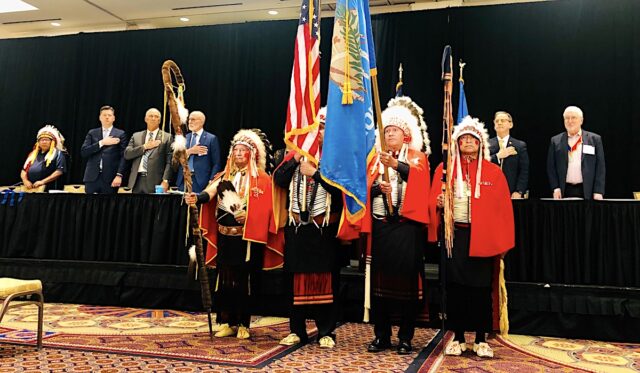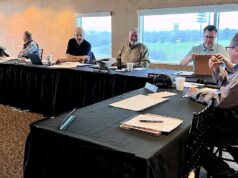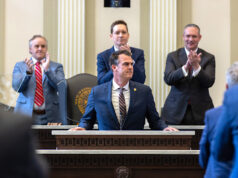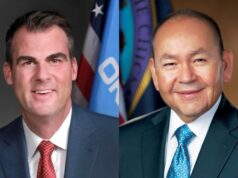

Lawsuits were a main point of discussion during last week’s 2023 Sovereignty Symposium, and for good reason. This month, the U.S. Supreme Court has handed down two decisions concerning tribal sovereignty and the federal government’s obligations to tribal nations.
Although last week saw the U.S. Supreme Court rule in favor of tribes and uphold the Indian Child Welfare Act, the court ruled Thursday against the Navajo Nation in a water rights dispute involving the Colorado River.
Both cases were discussed at the Sovereignty Symposium in Oklahoma City, which featured various panels about cultural, economic and legal matters. The event serves as an annual gathering of tribal leaders, attorneys, judges and others to discuss the reality of American Indian law today and potential outcomes in a scholarly, non-adversarial forum.
“We are a country of many different sovereigns, and yet we have been struggling for the past 250 years because we don’t have any formal rules, processes or procedures for how these multiple sovereigns are to engage,” Lauren Van Schilfgaarde, assistant professor at UCLA School of Law and Cochiti Pueblo citizen, said during one symposium panel. “All tribes have a level playing field with their sovereignty relations with the United States, but I think most of our practical experience with that is we all get the same bad deal when we get these varying decisions that come down.”
Colorado River management central to Arizona v. Navajo Nation
Marking the end of two decades worth of litigation, Thursday’s 5-4 decision in the Arizona v. Navajo Nation case found that the United States’ 1868 treaty with the Navajo Nation offers no promise to secure water for the tribe, which is struggling to acquire sufficient resources. More than 30 percent of households on the reservation lack running water altogether, according to the Navajo Nation.
The Navajo Reservation is the largest Indian Country reservation in the country, spanning more than 17 million acres and encompassing portions of northeastern Arizona, northwestern New Mexico and southeastern Utah. The Colorado River delineates the Navajo Reservation’s western border.
In 2003, the Navajo Nation sued the U.S. Department of the Interior and other federal agencies for claims under the National Environmental Policy Act and breach of trust for alleged failure to consider the tribal nation’s needs within the management of the Colorado River. Eventually, a district court dismissed the Navajo Nation’s petition, but the 9th Circuit Court of Appeals determined that the tribal nation should have been allowed to amend its ptetition.
Ultimately, Arizona, Nevada, Colorado and water districts in California appealed to the U.S. Supreme Court. The states’ petition argued that ruling in the Navajo Nation’s favor would entitle the tribe to receive water from the Colorado River’s Lower Basin, the rights to which have been debated extensively in Arizona v. California.
Should the 9th Circuit opinion be affirmed, the states’ petition said, it would have broad affects felt throughout the West, leaving those with adjudicated water rights in the Colorado River Basin subject to the mercy of the U.S. Bureau of Reclamation and the U.S. Bureau of Indian Affairs instead of the courts.
In response, the Navajo Nation filed a brief explaining its claim based on “the United States’ failure to secure the water it promised to the Navajos by treaty, wherever that water may come from.”
Justice Brett Kavanaugh wrote the majority opinion, exploring the 1868 treaty with the Navajo Nation and discussing the legality of the “affirmative steps to secure water” as requested by the Navajo Nation.
While the treaty explicitly required the United States to construct schools, a chapel and other infrastructure and services on the reservation, the treaty never explicitly outlined any obligation to secure water, Kavanaugh said.
“It is not the judiciary’s role to rewrite and update this 155-year-old treaty,” Kavanaugh wrote. “Rather, Congress and the president may enact — and often have enacted — laws to assist the citizens of the western United States, including the Navajos, with their water needs.”
‘The Navajo have waited patiently’
Justice Neil Gorsuch wrote a dissenting opinion and compared the Navajo’s experience seeking relief to the average American’s experience at a Department of Motor Vehicles office.
“The Navajo have waited patiently for someone, anyone, to help them, only to be told (repeatedly) that they have been standing in the wrong line and must try another,” Gorsuch wrote. “The government’s constant refrain is that the Navajo can have all they ask for; they just need to go somewhere else and do something else first.”
Navajo Nation President Buu Nygren expressed his disappointment with the Supreme Court’s major decision, but he said he was encouraged by the four justices — Gorsuch, Sonia Sotomayor, Elena Kagan and Ketanji Brown Jackson — who sided with the Navajo.
“It is reassuring that four justices understood our case and our arguments,” Nygren said in a statement. “As our lawyers continue to analyze the opinion and determine what it means for this particular lawsuit, I remain undeterred in obtaining quantified water rights for the Navajo Nation in Arizona.”
Indian Child Welfare Act case decided

On the other hand, a six-year legal battle came to an end last week in favor of tribal sovereignty with a 7–2 Supreme Court decision in Haaland v. Brackeen that upheld the Indian Child Welfare Act.
Signed into law by President Jimmy Carter in 1978, the act established federal standards for Native American child custody proceedings that afford placement preference to Native families for foster care and adoption.
Justice Amy Coney Barrett delivered the majority opinion, rejecting the plaintiffs’ arguments on their merits and for lack of standing. Joined by Sotomayor and KetJackson, Gorsuch filed a concurring opinion.
“Often, Native American tribes have come to this court seeking justice only to leave with bowed heads and empty hands. But that is not because this court has no justice to offer them,” Gorsuch wrote. “Our Constitution reserves for the tribes a place — an enduring place — in the structure of American life. It promises them sovereignty for as long as they wish to keep it. And it secures that promise by divesting states of authority over Indian affairs and by giving the federal government certain significant (but limited and enumerated) powers aimed at building a lasting peace.”
Principal Chief Chuck Hoskin Jr. of the Cherokee Nation lauded the Supreme Court for the decision, calling it a “major victory for Native tribes, children, and the future of our culture and heritage.”
“We hope this decision will lay to rest the political attacks aimed at diminishing tribal sovereignty and creating instability throughout Indian law that have persisted for too long,” Hoskin said in a statement. “By ruling on the side of children’s health and safety, the U.S. Constitution, and centuries of precedent, the justices have landed on the right side of history.”
The Indian Child Welfare Act was enacted because Congress found there is “no resource that is more vital to the continued existence and integrity of Indian tribes than their children.”
According to the National Indian Child Welfare Association, Native American and Alaskan Native children are four times more likely to be removed from homes by state child welfare systems than non-Native children, even when their families have similar presenting problems. About 56 percent of adopted Native American and Alaskan Native children are adopted outside their families and communities.
Chickasaw Nation Gov. Bill Anoatubby issued a statement after the Supreme Court decision was released and emphasized the importance of Native American children to tribes.
“We believe strong families are the foundation of a strong nation, which reinforces the need to offer children and families facing difficult circumstances the support they deserve,” Anoatubby said. “We will continue our work to protect children, support families, and engage communities, because those efforts make all of Oklahoma and our country stronger.”




















